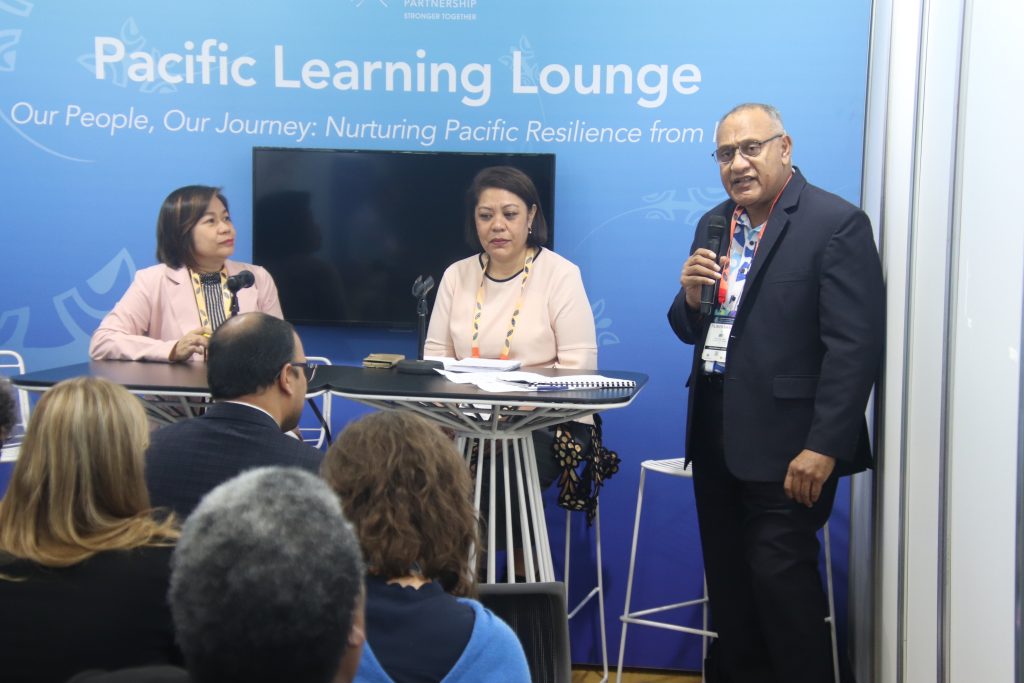REMARKS: DSG Manoni at the DRF Learning Event for the Asia Pacific Disaster Risk Reduction Conference
- Home
- Publications
- REMARKS: DSG Manoni At The DRF Learning Event For The Asia Pacific Disaster Risk Reduction Conference


Delivered by the Deputy Secretary General of the Pacific Islands Forum
Disaster Risk Finance Learning Event at the Disaster Risk Reduction Conference
Brisbane, Australia
20 September 2022
Good day, Ladies and Gentlemen
I bid you all warm Pacific greetings from the Forum Secretariat and welcome all of you to this Disaster Risk Finance Learning Event. First of all, thank you all for taking the time to be here today. I also want to thank our hosts, the Australian Government and UNDRR, for bringing us all together to discuss, reflect, share and learn from each other on how we as a region can work together to strengthen national and regional resilience.
In the last few years Pacific Island countries have continued to suffer significant economic setbacks whenever disasters hit. The impacts of climate change have further exacerbated these vulnerabilities. The impacts combine physical damage and the related economic and social losses. The cost of disaster relative to our GDP are significant ranging in most cases from 15 to 30%.A single event can wipe out decades of development gains in a matter of hours, and it is quite challenging for our countries to bounce back. The recent example of the Hunga Tonga – Hunga Ha’apai volcanic eruption is a good case in point where damage was estimated at 18.5% of GDP or USD500 million and the Government of Tonga have estimated that it will take them 4 years, with a total of USD 240 million to recover.
Learning events and opportunities for sharing such as this are critical as it allows us to expand our understanding on how we can better strengthen the implementation of our respective resilience agendas.
This learning event touches on a matter that is ‘at the very heart’ of our DRM approach– the issue of disaster risk financing or DRF. The core of the discussions will focus on the nexus of leadership and DRF Strategy. Having a separate and targeted approach to DRF through a DRF Strategy is key to ensuring financial protection, yet this idea has not received much traction in the Pacific - so far only Fiji, Tonga and Samoa have pursued this pathway. However, our Asian neighbors such as the Philippines, Indonesia, Myanmar, Cambodia to name a few have a structured approach to rapid response financing, and countries such the ASEAN member states are also contemplating having a regional DRF strategy.
The DRF strategy like any other national policies requires strong political leadership. Leadership is critical to ensuring ownership of the strategy as well as ensuring the sustainability of the efforts and gains made. In many cases, lack of political leadership has been identified as a major challenge in implementing national policies and strategies. It will therefore be interesting to hear from our distinguished panelists on the approaches they have adopted in order to gather the political support to advance the concept of a separate and strategic approach to financial protection.
We hope that at the end of this event your appreciation and understanding about Disaster Risk Financing will have been enhanced and that you will have found the learning and the experiences being shared by our esteemed panelists useful.
Before I conclude, I would also like to thank a number of organisations who have joined the Forum Secretariat in making this event possible. I would like to thank SPC, and UNDRR for their tireless support and their spirit of genuine collaboration. With that ladies and gentlemen, I wish you all the best and look forward to the discussion.
[ENDS]


